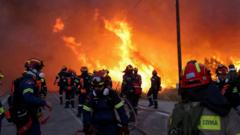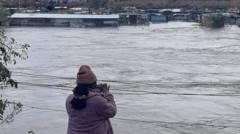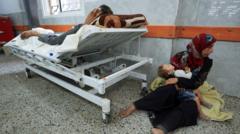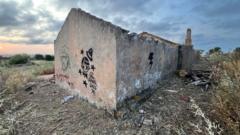The Iberian Peninsula faces significant challenges as power outages disrupt hospitals, transport, and commerce.
Power Outages Cause Widespread Disruption in Spain and Portugal

Power Outages Cause Widespread Disruption in Spain and Portugal
Millions left without electricity as blackouts impact daily routines and essential services.
In a cascading series of events on a busy Monday, tens of millions of residents across Spain and Portugal found their daily lives drastically altered due to extensive power outages. These blackouts left countless citizens in the dark for several hours, prompting urgent responses from local authorities.
During the outages, crucial services were heavily compromised. Hospitals were forced to rely on backup generators to ensure the safety of patients, while trains ground to a halt and supermarkets shuttered their doors, leaving many without access to food and essential supplies.
As the sun set, restoration efforts did commence in some Spanish areas, but many remained without power. Authorities rushed to diagnose and remedy the situation, hoping to return normalcy before nightfall.
Visual accounts of the disturbances depict a chaotic scene. In Córdoba, stranded passengers were seen abandoning high-speed trains, while in Pamplona, a hospital staff member was photographed relocating patients as the facility operated in emergency mode.
In Madrid, the impact was particularly visible. Long queues formed at bus stops as subways and trains remained nonfunctional. Traffic congestion ensued as stoplights ceased to operate, leading public workers to manage intersections manually. Meanwhile, the prestigious Madrid Open faced disruption, with match schedules thrown into disarray.
Nearby in Burgos, shoppers gathered in darkened supermarkets, utilizing their phone lights to navigate aisles that had gone dark. Across the border in Portugal, Lisbon’s restaurants maintained a dismal atmosphere as diners made do in darkened surroundings, while at Rossio Square, long lines formed for buses.
With residents contending with both physical and emotional strains, the outage underscored vulnerabilities in infrastructure across the Iberian Peninsula, making the restoration of power not just a matter of convenience, but essential for the safety and well-being of millions.
During the outages, crucial services were heavily compromised. Hospitals were forced to rely on backup generators to ensure the safety of patients, while trains ground to a halt and supermarkets shuttered their doors, leaving many without access to food and essential supplies.
As the sun set, restoration efforts did commence in some Spanish areas, but many remained without power. Authorities rushed to diagnose and remedy the situation, hoping to return normalcy before nightfall.
Visual accounts of the disturbances depict a chaotic scene. In Córdoba, stranded passengers were seen abandoning high-speed trains, while in Pamplona, a hospital staff member was photographed relocating patients as the facility operated in emergency mode.
In Madrid, the impact was particularly visible. Long queues formed at bus stops as subways and trains remained nonfunctional. Traffic congestion ensued as stoplights ceased to operate, leading public workers to manage intersections manually. Meanwhile, the prestigious Madrid Open faced disruption, with match schedules thrown into disarray.
Nearby in Burgos, shoppers gathered in darkened supermarkets, utilizing their phone lights to navigate aisles that had gone dark. Across the border in Portugal, Lisbon’s restaurants maintained a dismal atmosphere as diners made do in darkened surroundings, while at Rossio Square, long lines formed for buses.
With residents contending with both physical and emotional strains, the outage underscored vulnerabilities in infrastructure across the Iberian Peninsula, making the restoration of power not just a matter of convenience, but essential for the safety and well-being of millions.























